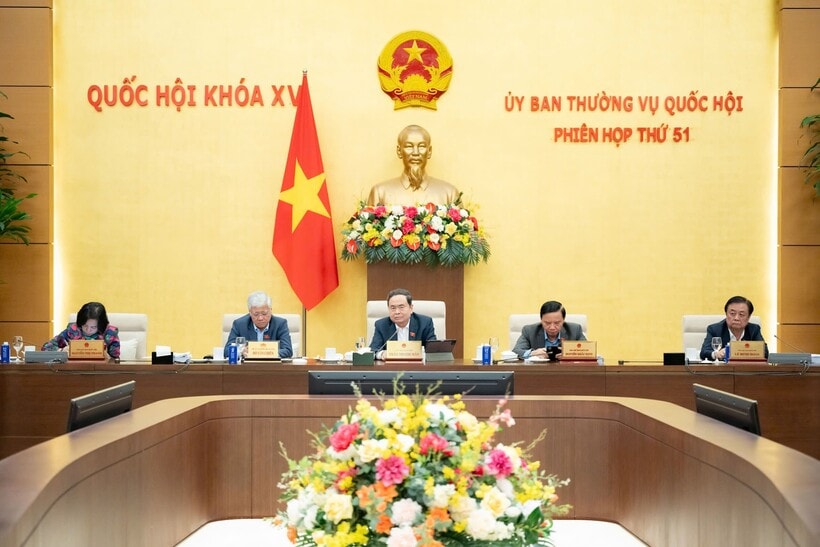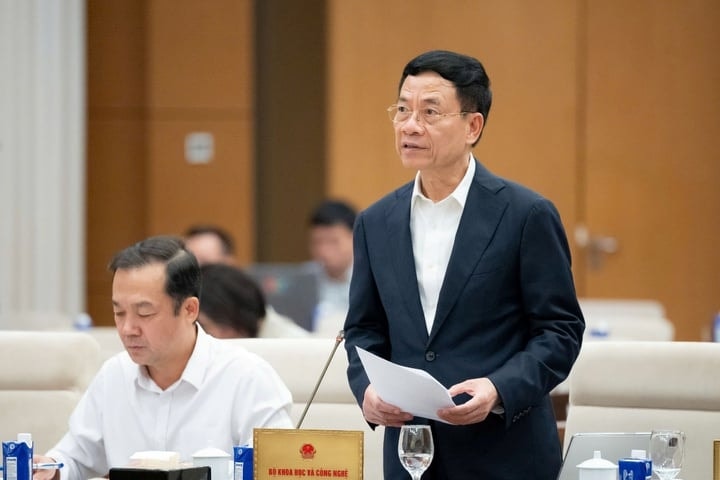The Law on Artificial Intelligence must ensure four key pillars
Alongside the benefits brought by artificial intelligence (AI), there are also many challenges such as cybersecurity risks, privacy violations, discrimination, and the potential misuse of AI for harmful purposes... Without a timely and robust legal framework for AI, Vietnam may risk trading progress for uncontrollable consequences.
As part of the 51st Session Program, under the chairmanship of the National Assembly Chairman Trần Thanh Mẫn and direction of Vice Chairman of the National Assembly Lê Minh Hoan, the Standing Committee of the National Assembly gave opinions on the draft Law on Artificial Intelligence.

Building a flexible and tech-adaptive legal framework
Regarding the necessity and objectives of the draft Law on Artificial Intelligence, Minister of Science and Technology Nguyễn Mạnh Hùng stated that the draft Law on Artificial Intelligence consists of 8 Chapters with 36 articles, aiming to institutionalize the Party and State’s policies, establish a breakthrough legal corridor for AI, create a favorable legal environment to promote innovation and enhance national competitiveness, while managing risks and protecting national interests, human rights, and digital sovereignty.

The draft Law on Artificial Intelligence ensures the institutionalization of the Party and State’s guidelines and orientations outlined in official documents and resolutions. The Law on Artificial Intelligence is a framework law, flexible and adaptive to technological advancements. It systematically and comprehensively stipulates measures to balance management with the promotion of research, development, deployment, and application of AI in Vietnam.
The Law on Artificial Intelligence places humans at the center, asserting as a fundamental principle that AI must serve humans, not replace them. Humans must oversee AI in critical decision-making processes; AI must be transparent, accountable, and safe.
Minister Nguyễn Mạnh Hùng noted that the Law on Artificial Intelligence inherits and abolishes existing AI-related provisions in the Digital Technology Industry Law No. 71/2025/QH15, while filling legal “gaps” to complete the regulatory framework. It selectively references international laws and practical experiences from countries that align with Vietnam’s context, legal system, and international commitments.
The Law also requires AI systems to do no harm, avoid bias, and respect human values, with mechanisms for oversight, inspection, and sanctions to ensure deterrence and strengthen social trust. The Government will promote an innovation ecosystem and high-quality human resources development through mechanisms supporting research, investment, and training for research institutes, enterprises, and individuals engaging in AI development.
For the first time, the draft Law introduces the concept of “unacceptable-risk AI systems” - those are capable of causing severe, irreparable harm to human rights, national security, public order, or safety, or those designed to perform prohibited actions. Systems in this category are strictly banned from development, provision, deployment, or use in any form in Vietnam.
Identifying indicators include: systems designed for prohibited behaviors; those using falsified or simulated individuals/events to deceive or manipulate cognition and behavior, causing serious harm; exploiting the vulnerabilities of sensitive groups; creating or spreading high-risk fake content that threatens national security, public order, or social safety.
According to the submission, AI's rapid development brings new security risks. Deepfake technology can be exploited to create fake news, defamation, fraud, and social instability. Autonomous weapon systems also pose ethical and legal challenges globally.
Meanwhile, the law-making process often lags behind technological progress, widening regulatory gaps. Therefore, the Government believes that it is necessary to promptly establish a legal framework that can both control risks and promote research and application of AI in Vietnam.
Ensuring 4 key pillars
Speaking at the session, National Assembly Chairman Trần Thanh Mẫn affirmed that the issuance of the Law on Artificial Intelligence is not only a technological matter but also a core driver of Vietnam’s socio-economic development, national security, and international integration.
To achieve this goal, the Chairman requested that the Law on Artificial Intelligence ensure 4 key pillars:
Promoting innovation: Creating an open legal corridor for research, application, and commercialization of AI products.
Ensuring human rights: Establishing mechanisms to ensure transparency, fairness, and accountability in all AI systems.
Risk-based management: Classifying AI systems by their impact level (low, medium, high, unacceptable) and applying corresponding management measures, especially for sensitive sectors.
International cooperation and data sovereignty: Ensuring harmonization with global standards while safeguarding national data sovereignty.
Chairman Trần Thanh Mẫn emphasized that the draft Law on Artificial Intelligence must retain distinctive characteristics: placing humans at the center; ensuring cybersecurity and national autonomy; inclusive and sustainable development; and balanced, harmonized governance. The risk-based classification of AI is a creative highlight that enables effective control of AI systems potentially affecting national security, human rights, and social order. He noted that Vietnam should “build, review, upgrade, and learn as we go”.
Additionally, the Chairman reminded the drafting agency to thoroughly study the issues raised in the draft Law to ensure feasibility and avoid overlaps with sectoral laws. The Law on Artificial Intelligence will serve as a framework law; detailed implementation guidelines will be the responsibility of the Government.
Laying the foundation for a comprehensive governance framework
On behalf of the appraisal body, Chairwoman of the National Assembly’s Committee for Science, Technology and Environment Nguyễn Thanh Hải stated that after reviewing the draft documents, survey results, and feedback from the plenary session, the Committee has issued Appraisal Report No. 4439/UBKHCNMT15 dated 17/11/2025, submitted to the Standing Committee.
Regarding the balance between management and development (research, development, deployment, and application), the Committee noted that the concept of “balance” is unclear and not entirely appropriate. Management and promotion are not opposing goals; transparent and effective management is the foundation supporting sustainable development.
This is a fundamental issue influencing how the Law’s provisions and policies are designed and will directly affect implementation effectiveness and socio-economic impacts once the Law is enacted.
If management is too strict, it may hinder rapid development and limit capabilities and competitiveness. If it is too loose, risks and adverse impacts may become uncontrollable.
Therefore, the Committee proposed that the drafting agency revise the policy viewpoint, replacing “balance” with “harmonize management and promotion” across all related stakeholders to ensure feasibility.
Regarding the framework law approach, the Committee agrees with the drafting agency.
Some opinions noted that AI development worldwide is evolving rapidly, with many unpredictable issues, so although this is a framework law, amendments or supplements may be required in a short time.
Other opinions suggested that the Law on Artificial Intelligence should serve as a foundational law, and each specialized law should contain a chapter on AI relevant to its sector.
Regarding constitutionality, legality, coherence with the legal system, and compatibility with international treaties, the Committee found that the draft Law is generally consistent with the Constitution and harmonized with the legal system.
However, the Committee recommended further reviewing consistency with laws such as the Civil Code, the Law on Product and Goods Quality, the Law on Standards and Technical Regulations, and clarifying the relationship between this Law and other sectoral laws (education, healthcare, transport, media, and the draft Intellectual Property Law regarding copyright for AI-generated works, as well as AI content in general and higher education curricula).
Regarding compatibility with international treaties, the Committee recommended incorporating updates from the newly signed United Nations Convention on Countering Cybercrime (Hanoi Convention), signed in Hanoi on 25-26 October 2025.
In conclusion, Vice Chairman of the National Assembly Lê Minh Hoan stated that the Standing Committee appreciates the Government, the Ministry of Science and Technology, the Committee for Science, Technology and Environment, and other National Assembly bodies for their proactive and decisive preparation of the draft Law on Artificial Intelligence and its appraisal within a limited timeframe.
Despite the draft Law containing many new, complex, and technical contents and the time pressure, the Government, Ministry, Committee, and other parliamentary bodies made strong efforts to ensure the quality of the draft submitted for review.
Vice Chairman Lê Minh Hoan suggested that the Government instructs the drafting agency and relevant bodies to review, study, and fully incorporate the opinions from the Standing Committee, the Ethnic Council, and other parliamentary committees. All parties agree that this is a framework law to be submitted to the National Assembly for consideration.
Additionally, the Standing Committee agreed to submit the draft Law on Artificial Intelligence to the National Assembly for discussion at this session. The drafting agency is fully responsible for the results of revisions and the quality of the draft presented to the Standing Committee; the Committee for Science, Technology and Environment will lead the appraisal, in coordination with the Ethnic Council and other committees, and report to the National Assembly for consideration at the 10th Session of the 15th National Assembly./.
Translated by Vietnam Journal of Science and Technology (VJST - MOST).
